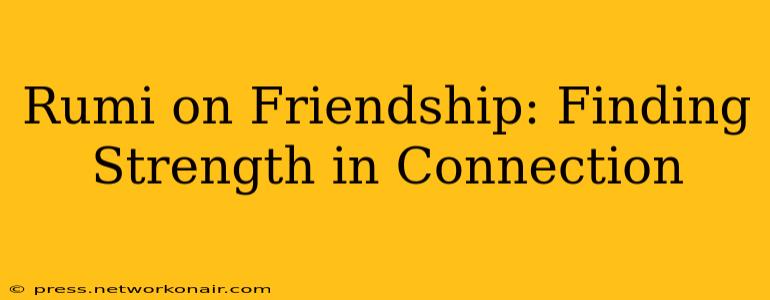Rumi, the 13th-century Persian poet and Sufi mystic, understood the profound power of friendship. His poetry isn't just filled with romantic love; it overflows with the deep, abiding affection and wisdom found in true companionship. For Rumi, friendship wasn't simply a pleasant pastime; it was a vital element in the spiritual journey, a source of strength, and a mirror reflecting the soul. This exploration delves into Rumi's perspective on friendship, revealing the timeless insights he offers on building meaningful connections.
What are Rumi's main ideas about friendship?
Rumi's concept of friendship transcends casual acquaintance. It's characterized by a profound understanding, mutual support, and a shared spiritual path. He believed that true friends are those who see beyond the superficial, recognizing the divine spark within each other. This recognition fosters a bond of unconditional love and acceptance, providing solace in times of adversity and celebration in moments of joy. His poems often depict friends as fellow travelers on a quest for truth and self-discovery, encouraging and inspiring each other along the way. Essentially, for Rumi, friendship is a sacred bond, mirroring the divine love that connects all beings.
How does Rumi describe the qualities of a true friend?
Rumi’s poetry subtly but powerfully reveals the qualities he valued most in a friend. He emphasized the importance of authenticity and vulnerability. True friends are those who are comfortable being themselves, sharing their vulnerabilities, and accepting the imperfections of others. Loyalty and unwavering support are also crucial. A true friend stands by you through thick and thin, offering encouragement and empathy without judgment. Furthermore, Rumi suggests that a true friend acts as a mirror, reflecting your strengths and weaknesses, helping you to see yourself more clearly and facilitating self-growth. Finally, shared spiritual aspirations often underpinned his concept of friendship; friends were companions on a shared journey towards enlightenment.
What is the spiritual significance of friendship according to Rumi?
For Rumi, friendship had profound spiritual significance. He saw it as a pathway to self-knowledge and a crucial element in the spiritual journey. Friends, he believed, helped to illuminate the hidden aspects of oneself, acting as catalysts for personal growth. The mutual love and support shared between friends mirrored the divine love that permeates the universe. Through this connection, individuals could experience a deeper sense of belonging and unity, ultimately bringing them closer to the divine. The shared journey of spiritual exploration and mutual support strengthened both individuals' connection to their spiritual selves.
How can we find true friends according to Rumi's teachings?
While Rumi didn't provide a step-by-step guide, his poetry offers clues. Cultivating self-awareness and authenticity is paramount. By understanding oneself deeply, one can attract individuals who resonate with one's true self. Openness and vulnerability are also key. Sharing your genuine self, fears, and aspirations allows for deeper connections. Active listening and empathetic understanding are crucial in forging strong bonds. Rumi’s emphasis on shared spiritual aspirations suggests seeking connections with those who share similar values and life goals. Essentially, the path to finding true friends lies in becoming a true friend oneself.
Does Rumi talk about the challenges of friendship?
While Rumi celebrated the beauty and strength of friendship, he wasn't blind to its challenges. Disagreements, misunderstandings, and even betrayals can occur. However, his approach highlights the importance of forgiveness and understanding in navigating these difficulties. True friendship, for Rumi, involves navigating these challenges with grace, maintaining compassion, and valuing the bond despite imperfections. His focus wasn't on avoiding conflict but on resolving it with wisdom and understanding, strengthening the connection rather than destroying it. This resilience and capacity for forgiveness are fundamental aspects of enduring friendships.
Rumi's perspective on friendship offers a timeless and profound message. It's not merely about social connection, but about a deeply meaningful relationship that enriches our spiritual lives and helps us navigate the complexities of human existence. By embracing the qualities he valued – authenticity, vulnerability, loyalty, and spiritual understanding – we can cultivate the kinds of friendships that truly nourish the soul.

